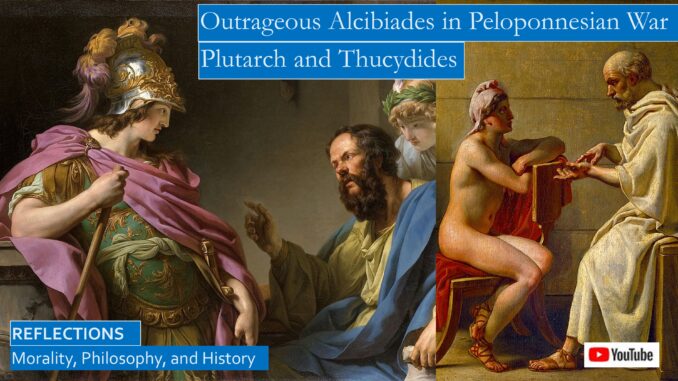
You cannot understand the historical setting of the Platonic dialogues without reflecting on the history of the Peloponnesian Wars, because so many of the leading figures of this period are referenced in the Platonic dialogues.
Likewise, you cannot understand either the Platonic dialogues or the history of the Peloponnesian Wars unless you reflect on the most influential advisor, general, and diplomat of the war, Alcibiades. Alcibiades, lover of Socrates, is a charismatic carousing character in the influential Platonic dialogue, the Symposium, a dinner party where the guests debate the nature of love, and the play highly regarded by both the ancient and medieval world was dedicated to Alcibiades, though modern scholars deprecate it since Plato likely was not the author.
YouTube video for this blog: https://youtu.be/b7QLp1HrOMs
YouTube script with more book links: https://www.slideshare.net/BruceStrom1/alcibiades-in-peloponnesian-war-according-to-plutarch-thucydides-and-xenophon
Link to view complete series of blogs on the Peloponnesian Wars:
https://seekingvirtueandwisdom.com/category/peloponnesian-wars/
Link to view complete series of videos on the Peloponnesian Wars:
https://www.youtube.com/watch?v=szi7-9QQWI0&list=PLJVlY2bjK8lg2pivnGN3m13VI8YstKs0T
Thucydides quotes the comic playwrights who say that regarding Alcibiades, the Athenians Love Him, Hate Him, and Can’t Do Without Him. During the war, he first advises the Athenians, then the Spartans, then the Persians, then he advises and leads the Athenians again, and everyone who takes his advice is successful in the war, but he manages to irritate so many Greeks and, after the war ends, is eventually slain by the Persians and Spartans.
Also, just like the Americans living in the 1950’s and 1060’s saw World War II as a recent event, so the Greeks in the Platonic Dialogues saw the Peloponnesian War as a recent event, and it colored their perception of the world, and philosophy.
SUMMARIZING PAST EVENTS OF THE PELOPONNESIAN WARS
The Peloponnesian Wars followed the Greco-Persian Wars by about fifty years, or as Thucydides describes it, the Pentecontaetia. In the Greco-Persian Wars, the Persian forces were defeated on both land and sea by the mainland Greeks, and how the Delian League was formed as a defense against Persian, and how that evolved into an oppressive Athenian Empire. We consulted both Plutarch and Thucydides to tell the story of Pericles up through his death by the plague in the second year of the Archidamian War, the first phase of the Peloponnesian Wars.
We will view the Peloponnesian Wars after the death of Pericles through the eyes of the most remarkable character of these wars, Alcibiades. He was also a close friend, and Plutarch says lover, of Socrates.
Socrates saved Alcibiades’ life when they were serving together as Athenian hoplites. In the Battle of Potidaea, Plutarch tells us that “a fierce engagement took place in which both men displayed great bravery, and when Alcibiades fell wounded, Socrates stood over him, kept the enemy at bay, and manifestly, in plain view of everyone, saved him along with his arms and armor.”[1]
Plutarch reveals the vices of Alcibiades, “But along with his statesmanship, eloquence, pride, and ingenuity went, by contrast, a luxurious lifestyle of overindulgence in drink and sex, effeminacy of dress,” “and incredible extravagance.” Many “notable men of Athens combined feelings of abhorrence and disgust with the fear of his haughty and lawless attitude, which could be tyrannical in its excessiveness. As for the common people, their feelings toward him have been well summed up by Aristophanes,” and this is one of the most famous statements about Alcibiades, “They miss him, they hate him, they can’t live without him.”[2]
Alcibiades was born in Athens to an aristocratic family who historically served as guest-friends to the Spartans. The guest-friend relationship was an expression of the Greek concept of xenia, or diplomacy, which was the theme of Homer’s Odyssey. His family often hosted Spartan aristocrats when they visited Athens, either on official or personal business.[3] Both his parents died when he was quite young, his father died in combat commanding a trireme he outfitted for the state, and he was raised in the household of Pericles, who became one of his guardians.
Plutarch tells us the essence of his character: “As for Alcibiades’ good looks,” “they bloomed in his childhood, in his youth, and when he had grown up too; however old he was,” “his attractiveness, charm, and good looks never left him.” “He was highly passionate, and his most powerful motivation was the desire to compete, and to come first.”[4]
From his youth, Alcibiades was attracted to the teaching of Socrates. Plutarch comments, “the fact that Socrates was in love with him strongly suggests that the boy was endowed with a natural aptitude for virtue. Socrates saw Alcibiades’ good looks as the brilliant external manifestation of this excellence,” and he worried about the Athenians and Greeks abroad “employed flattery and favoritism to win over his affections. So, Socrates set out to protect him from these influences; Socrates could not stand by and watch a blossoming tree wastefully destroy its own fruit.”
When you look for paintings of Alcibiades, you will find many of them depict Socrates continually tearing Alcibiades from the arms of lovers and courtesans. Plutarch suggests that his relationship with Socrates went beyond that of a mere teacher: “Although Alcibiades had been spoiled” and undisciplined “all his life,” “nevertheless his innate excellence let him to recognize Socrates, and he shunned his rich and eminent lovers in favor of associating with Socrates. He soon became close to Socrates, and heard arguments from a lover who was not hunting after unmanly pleasure, and was not begging him for kisses and caresses, but was trying to expose the unsoundness of his mind and was harrying his vain and foolish pride. And then ‘Alcibiades crouched down in fear, like a defeated cock, with wing aslant, and he believed that Socrates’ mission really was a way of carrying out the gods’ wishes by looking after young men and keeping them free from corruption. He began to despise himself and admire Socrates; he began to value Socrates’ kindness and feel humbled because of his goodness.”
So, Socrates pursued Alcibiades more as an irate schoolmaster than as a lover: “Socrates with his love did tend to subdue Alcibiades, who had sufficient innate excellence for Socrates’ arguments to get through to him, wrench his heart, and start the tears flowing. But he also sometimes surrendered to his flatterers and all the delights they held out, and then he would give Socrates the slip and be hunted down, for all the world like a runaway slave, because Socrates was the only one of his lovers he respected and feared, while he had nothing but contempt for the rest.”[5]
Aa Alcibiades was as charming as he was popular, he had many friends and hangers-on. Plutarch tells us that the corrupters of sensual Alcibiades “set him prematurely on the road of high endeavor; they convinced him that as soon as he took up politics, he would not merely eclipse all the other military commanders and popular leaders but would gain more power and prestige” “than even Pericles enjoyed. Just as iron, then, is softened in the fire, but is hardened again by cold,” “so time and time again Socrates took him back in a state of complete promiscuity and presumptuousness, and by force of argument would pull him together and teach him humility and restraint, by showing him how great his flaws were and how far he was from virtue.”[6]
Did Alcibiades also have a measure of contempt for his wife? Plutarch also tells us some uncomplimentary details, his wife, “Hipparete was a well behaved and affectionate wife,” but Alcibiades’ liaisons with courtesans offended her, “so she moved out of the house to go live with her brother. This did not worry Alcibiades.” “Hipparete had to lodge the petition for divorce with the archon personally rather than through proxies. But when she arrived to see to this business as the law required, Alcibiades came up, grabbed hold of her, and took her back home with him, and although he passed right through the city square, no one dared to oppose him or take her away from him. She stayed with him, however, until her death, a short while later.”
Plutarch even tells us an uncomplimentary story about his dog. “Alcibiades had a remarkably large and attractive dog with a particularly fine tail, but he cut it off. When his close friends admonished him, warning him that everyone was saying bad things about him because of his tailless dog, he laughed and said, ‘That’s exactly what I want to happen. I’m perfectly happy for the Athenians to chatter about my dog, this will stop them from saying anything worse about me.”[7] If this is how he treats his dog, how does he treat his friends, if he indeed truly has any?
But Alcibiades was a masterful politician, and although he often pursued policies that would win him glory in battle, he had many qualities of statesmanship. Plutarch tells us, “Alcibiades was particularly good at understanding the essential points of an issue, then finding the perfect argument, then coining the perfect words and phrases” for a speech, “and since a large vocabulary was not one of his gifts, he often used to hesitate, fall silent in the middle of a speech, and interrupt the flow, while searching for an elusive expression, before picking up the threads again and proceeding with caution.”[8]
Alcibiades was the first Greek to enter seven chariot teams in the Olympic Games, and since his teams “came in first, second, and forth place meant that he gained more in terms of distinction and renown than anyone could have ever hoped to achieve.”[9]
In the ancient Greek city-states, it was common for aristocrats to fund many public functions that today are funded either by the city government, or professional sports teams or concert promoters. But as Plutarch tells us, Alcibiades displays his flamboyance here also: “the donations Alcibiades made, the choruses he financed, the superlative extravaganzas he put on for the city, the fame of his ancestors, his eloquence, his physical good looks and fitness, and his experience and prowess in war made the people of Athens tolerate and make allowances for everything else about him.”[10]
We discussed in a prior video how Nicias negotiated the Peace of Nicias, which halted direct hostilities between Athens and Sparta for nearly six years, though it was a fragile peace where low-level hostilities continued, particularly by the Spartan allies. Alcibiades was jealous of Nicias, and this clouded his judgment.
Plutarch tells us, “the admiration Nicias won from Athens’ enemies irritated Alcibiades just as much as the respect paid him by his fellow citizens. For although Alcibiades was the Lacedaemonian representative in Athens and had looked after the interests of the Spartans captured at Pylos, Nicias was chiefly responsible for the Lacedaemonians obtaining peace and recovering the prisoners, and so the Lacedaemonians felt a great deal of affection for him. Moreover, the Greeks used to say it was Pericles who had brought them into conflict and Nicias who put an end to the war; in fact, the most common name for the peace was the Peace of Nicias. All this made Alcibiades exceedingly irritated, and he spitefully began to try to find ways to undermine the peace treaty.”[11]
The Peace of Nicias would be broken by the ill-fated Sicilian Expedition. Plutarch explains, “even during Pericles’ lifetime, the Athenians had coveted Sicily, and after his death they tried to gain control over it. From time to time, they sent what they described as ‘missions to relieve and reinforce the victims of Syracusan aggression.’” “The person who fanned this smoldering desire of the Athenians” to conquer Syracuse in Sicily to “full flame and convince them not to set about the task gradually or by halves, but to send out a large fleet and overrun the island, was Alcibiades.”[12]
We discussed the Sicilian Expedition in depth previously, so we will only summarize the events from the perspective of Alcibiades. The Athenians voted to send a massive fleet of over a hundred triremes and thousands of hoplite infantry to invade Syracuse, they appointed Nicias as senior general to temper the impetuous ambitions of the irrepressible general Alcibiades. One night just before the expedition set sail, someone knocked off the faces and phalluses of the hermae in Athens, these were talismanic statues on the porches of temples and houses to ward off evil spirits. This was seen as an evil omen, and many suspected that Alcibiades was behind this prank.
Why did so many Athenians suspect Alcibiades? Because many devout Athenians were offended by the raucous drinking and carousing by Alcibiades and his sycophants; once, as Professor Kenneth Harl of the Teaching Company relates, Alcibiades had staged a mock version of the religious ceremonies surrounding the Elysian Mysteries.[13]
So that should top our list of Plutarch’s moral and strategic lessons:
- Generals should not mock the Elysian Mysteries, or any other religious observance.
Many of the rowers and hoplites embarking on this great adventure were sympathetic to Alcibiades, so no charges were immediately brought forward. But a few months afterwards, these votes no longer counted, so charges were brought now that his prosecution was certain. Plutarch tells us his enemies in Athens “found Alcibiades guilty in abstentia, confiscated his property, and also decreed that he should be publicly cursed by all the priests and priestesses in the city.”
A trireme was sent to fetch him to face trial in Athens, but while in port he jumped ship. Plutarch continues, “Alcibiades immediately made his way to the Peloponnese.” “He sent a message to Sparta, asking for asylum, and promised to render them the same kind of service and assistance that would outweigh the harm he had done them before, when they were on opposite sides.”
Plutarch tells us that after Alcibiades had been recalled from the Sicilian expedition, “the men’s morale dropped with his departure. They anticipated a long, drawn-out, sluggish war under Nicias’ leadership, now that the person had stirred things up had been removed.”[14]
And we know what happened at Syracuse. Nicias dawdled, Nicias was overly cautious, Nicias wasted years in a campaign that should have lasted months, and all the while his Syracusan enemies, being trained by the Spartan general Gylippus, grew stronger and stronger. By the time the skilled general Demosthenes brought even more reinforcements it was too late, as Nicias, as senior general, dawdled, both he and Demosthenes and nearly all the hoplites and rowers were executed, or died in the mines, none made it back to Athens, and over two hundred triremes were destroyed.
Now we can add to Plutarch’s list of moral and strategic lessons:
- Generals should not mock the Elysian Mysteries, or any other religious observance.
- Never expect that timid generals will ever deliver dramatic victories.
Lincoln would later re-learn this lesson with his timid General George McClellan in the American Civil War. - If you want to win a war, you must tolerate the eccentricities of your most talented generals.
During the Civil War, Lincoln found a fighter who was willing to do battle with the Confederates in General Grant. When challenged on whether he drank too much, Lincoln replied that he would recommend Grant’s brand of whiskey to his other generals, so they would fight also. - Do not force your most promising general into exile.
WHEN IN SPARTA, DO AS THE SPARTANS DO
Like many aristocrats, Alcibiades had guest-friends in many Greek city-states, particularly in Sparta, since his family was historically a guest-friend for the Spartans. In our prior video, we described how he had double-crossed some Spartan delegates visiting Athens on a diplomatic mission. Although some Spartans must have remembered this deceit, his Alcibidian charm won over many enemies over the course of his life.
Plutarch tells us how he became the quintessential Spartan. “In Sparta, in public as well as in private, he became a well-known and much-admired figure. During this period, he gained influence over the common people there, and held them spellbound by adopting a Laconian style of life. When they saw him with his hair in need of a close cut, bathing in cold water, accustomed to course bread, and supping broth, they seriously doubted whether this was a man who had ever had a cook in his house, or set eyes on a perfumer, or could endure the touch of Milesian wool.”
Plutarch tells us that Alcibiades possessed a skill “for captivating men, and that was he could assimilate and adapt himself to their habits and lifestyles. He could change more abruptly than a chameleon. The only difference between him and a chameleon that was that a chameleon apparently finds it totally impossible to color himself white;” while Alcibiades could turn himself into any color when “in the company of good men or bad. There was nothing he could not imitate and no habit he could not acquire.”
Alcibiades gave the Spartans much valuable advice on how to win the war, from Plutarch:
- First, Alcibiades persuaded the Spartans to send to Syracuse “the Expeditionary force under Gylippus to crush the Athenian army there.
- Secondly, he advised them to restart at the war against the Athenians in Greece.
- Thirdly, he persuaded the Spartans to fortify Decelea,” a Spartan outpost near Athens, “which played a more crucial part than anything else in bringing him out the destruction and downfall of Athens.”[15]
In the first phase of the war, before the Peace of Nicias, the Spartans would ravage the crops and fields and homes in the Athenian countryside for about forty days, then return home. With their Attic fortress in Decelea fortified, the Spartans could ravish Attica all year round, and they did this for a decade.
But Alcibiades is still Alcibiades, he always shows his sensual side. Plutarch tells us, “While King Agis was out of the country on campaign, Alcibiades seduced his wife Timaea so thoroughly that not only did she get pregnant with his child, but she did not deny it.” “As for Alcibiades, he used to say, in his willful fashion, that it was not defiance or lust that had led him to do it, but rather because he wanted to have his descendants rule over the Lacedaemonians.”
Professor Harl has an amusing discussion exploring exactly why Alcibiades did this. Did he expect to get away with this outrage? Like many men who fool around, you can ask: What was he thinking? Harl compares him to many of the rowdy British aristocrats in the late colonial age, but comes to only possible conclusion: that Alcibiades was just being Alcibiades, he did this simply because he could do it.[16] Alcibiades reminds me of the Romeo libertine archetypes in the Hesse novels, such as Narcissus and Goldmund.
Plutarch continues, “Now Alcibiades had an enemy in King Agis, whose hostility was due not over just his troubles with his wife, but also to his resentment of his reputation Alcibiades was acquiring for being responsible” “for nearly all the successes they enjoyed, and prompted by their envy, the most influential and ambitious Spartans also had enough of Alcibiades.” So now Alcibiades was not only exiled from Athens, he was also under a death sentence from Sparta! [17]
Updating Plutarch’s list of moral and strategic lessons:
- Generals should not mock the Elysian Mysteries, or any other religious observance.
- Never expect that timid generals will ever deliver dramatic victories.
- If you want to win a war, you must tolerate the eccentricities of your most talented generals.
- Do not force your most successful generals into exile.
- Generals should not sleep with and impregnate the King’s wife.
ATHENS SLOWLY RECOVERS FROM HER DISASTROUS DEFEAT IN SICILY
We will leave Alcibiades hanging “in flagrante dilecto” while we discuss how the Athenians fared after their disastrous defeat in the Sicilian Expedition. The years immediately after the disastrous Sicilian Expedition were touch and go for Athens. Soon after they learned of their defeat, Thucydides says that the Athenians feared that “their enemies in Sicily, after their great victory, would set sail immediately with their fleet for the Athenian port at the Piraeus, that their enemies at home would now most certainly redouble their efforts and attack them with all their might by land and sea, and that their allies would revolt and join in the attack.” “In particular, the subjects of Athens were ready to revolt; indeed, they were incapable of taking a dispassionate view of things,” and expected that “Athens would not survive the coming summer.”[18]
The Athenians rallied, they still had over a hundred triremes both in reserve and on the docks, many battles were fought, often the Athenians won, sometimes the Spartans won, and the Athenians gradually regained some of their former power in the Aegean Sea, while the Spartans were discouraged.
Now that they had declared war, the Spartans had to build up their fleet. Though now the Persians were open to funding this shipbuilding effort, this construction took time, and they also had to train their crews. The Spartan commanders before Lysander were unimaginative, and often were reluctant to engage in naval battles with the Athenians, fearing defeat.
WHEN IN PERSIA, DO AS THE PERSIANS DO
Where to go now? To the court of the Persians, the destination for many exiled Greek leaders. Plutarch tells us, “for safety’s sake, he entrusted himself to Tissaphernes, a satrap of the Persian king in Ionia. “Before long, there was no one Tissaphernes admired or valued more than Alcibiades. This Persian was a devious and malicious man, who felt no qualms about doing wrong, and he was impressed by Alcibiades’ versatility and extraordinary ingenuity.”
Plutarch describes how Alcibiades adapted to the Persian court. “In Sparta Alcibiades exercised, lived frugally, and wore a frown on his face; in Ionia he was fastidious, companionable, and easy living; in Thrace he went in for hard drinking and hard riding; and when he was with the Persian satrap Tissaphernes he outdid the Persians, for all their magnificence, with his pomp and extravagance.”[19]
Previously he had given the Spartans excellent advice on how to win the war, now his advice to the Persians was equally valuable. Plutarch tells us how Alcibiades “set about maligning and defaming the Spartans to Tissaphernes. He did not want the Persians to be too ready to help the Spartans and thereby destroy the Athenians but preferred to let them have a miserly amount of support, so that they would gradually get into difficulties and be worn down; in this way, he argued, both sides would exhaust each other and fall into the Persian king’s hands. Tissaphernes was easily convinced by this and made no secret of his admiration and approval of Alcibiades.”[20]
ALCIBIADES ANGLES FOR ATHENS TO RECALL HIM
The main Athenian naval base on the island of Samos was not that far from the court of Tissaphernes. Alcibiades started putting out feelers to the Athenians, though he was more popular with the rowers than he was with the generals.
Let us summarize the career of Alcibiades:
- Athens enthusiastically, at the urging of Alcibiades, embarks on the Sicilian Expedition, but then they recall him.
- Alcibiades, in exile in the Peloponnese, advice the Spartans on how to best manage the war.
- After sleeping with the Spartan King’s wife, Alcibiades then advises the Persians on how to best manage the war.
- Alcibiades then angles his comeback as a victorious Athenian general, completely reversing the tides of war, until Athenian anger compels him to go into exile once again, and afterwards, Athens loses the war.
What a remarkable career! He is on all sides, and on the Athenian side twice! You might ask yourself, What is going on here? Why did the Athenians welcome him back? Wasn’t Alcibiades guilty of treason?
I have not encountered any mention of the concept of treason in any of the ancient Greek sources. In part, this may be due to the cultural evolution of the guest friend relationships, where aristocrats can freely travel between Greek city-states even when they are at war with each other.
To shed more light on this issue, we will consult Xenophon’s description of the role Alcibiades played in the Peloponnesian Wars:
“Alcibiades had been banished” during the Sicilian Expedition “not because he deserved it, but because of the intrigues of people who were inferior to him in power, who lacked his abilities to speak, and whose only political principle was their own self-interest.”
So, Alcibiades did not act in his own self-interest? Anyway, Xenophon describes the injustice of his trial after he chose exile, then says this about his time spent assisting Sparta: “In his exile he had been the helpless slave of necessity and, being every day in danger of losing his life, had no other course but to make himself agreeable to those who he hated most.”[21]
Thucydides was also an exile in Sparta after he lost his Athenian command, but he did not assist the Spartan war effort, but instead began a second career as a historian. But this justification by Xenophon of the actions of Alcibiades was no doubt shared by many Athenians.
Coming back to Samos, the Athenians were worried about the hundred and fifty Phoenician triremes that they were expecting to sail into the Aegean Sea from Phoenicia. The sources are unclear whether these triremes even existed, but many Athenians worried about them. Plutarch tells us, “Alcibiades was aware of these fears, and he sent a secret message to the Athenian leaders on Samos on how” he could possibly bring Tissaphernes over to their side. He claimed his motive was to save Athens, but one of the military commanders, Phrynicus, “suspected, quite rightly, that Alcibiades said just as much or little use for an oligarchic government as he did for the democratic one, that he was only looking for some way to return to Athens,” preferably as a conquering general.
Alcibiades was not the only Athenian who is talking to Tissaphernes, and there were some crossing and double-crossing and double-double-crossing, but in this type of affair, Alcibiades usually gets the upper hand, and he did in this case, and the Athenian commander was stabbed to death in the city square with a dagger.
The comeback of Alcibiades also dovetailed with the machinations of aristocrats conspiring to set up a government of four hundred aristocrats, and they assured the Assembly to coax them into voting themselves out of power, that this would be eventually replaced by a government of the five thousand, after the wartime emergency was over. Alcibiades saw through their plans, outmaneuvered them, insisting that the government of five thousand be immediately instituted, and in response, many of the scheming aristocrats fled for refuge with the Spartans, showing their true colors. This complicated episode is documented by Thucydides.
Plutarch comments on the sound strategic sense of Alcibiades in this situation. “If anybody else had been unexpectedly appointed head of this Athenian fleet at Samos by popular favor, what would he have done? He would immediately have thought it his job to please, and nothing to oppose, the people who just saved them from the life of a wandering fugitive and appointed him to lead and command a mighty fleet and army, with powerful resources. But not Alcibiades. Instead, as befitted a great leader, he resisted their angry impulses and stopped them from making a great mistake.”
If Alcibiades had sailed to Athens, civil war could have erupted; it could have “pitched Athenians against Athenians and made the city itself a theater of war. It was thanks to Alcibiades, more than anything else, that this did not happen. He not only gave convincing reasons for not setting sail in his speeches to the assembled troops, but he also lobbied them individually, pleading with them to curb their enthusiasm.”
Alcibiades also promised that the Persian triremes would either join the Athenian side or at least do not go over to the Spartans. He was likely overstating his influence with the Persians under Tissaphernes.[22]
Plutarch comments on how accurately he assessed the political situation. “The Athenians wanted Alcibiades to return from exile and urged him to do so, but he had no desire to come back empty-handed, without having achieved anything, with his restoration achieved thanks merely to pity and popularity; instead, he wanted to come back in a blaze of glory.”
To gain favor, he needed military victories. Plutarch relates the story of his first victory, “Alcibiades heard that the entire Lacedaemonian fleet” “had pulled back into the Hellespont with the Athenians in pursuit, so he quickly set out to help his fellow commanders. As luck would have it, he managed to arrive with his eighteen triremes at the precise moment when both sides had committed their entire naval forces to a battle off Abydos, and had been engaged in a fierce struggle all day, with one side winning here, the other side there.” “Alcibiades heads straight for the left for the Peloponnesians who had gained the upper hand and were forcing the Athenians into retreat. He scattered them and drove them ashore but continued after them until he rammed and disabled their ships. The Athenians captured thirty enemy ships, recovered their own, and erected a victory trophy.”
For some odd reason Alcibiades had a grand idea of showing off his achievements to Tissaphernes, but arrested Alcibiades and threw him in jail, where he languished for a month before escaping on horseback, spreading a rumor that he had been released by Tissaphernes, to discredit him in the eyes of the Spartans.[23]
Alcibiades learned that the Spartan commander Mindarus had combined with the Persian satrap Pharnabazus in the Hellespont, and where their forces were located. “Alcibiades delivered a stirring speech to the Athenians, telling them that they would now not only have to fight on sea and on land, but even besiege the enemy in his fortresses, because there was no money to pay them unless they won every battle they undertook, whatever kind of warfare it involved.” This was a troubling sign, both sides were running out of money, and both sides were increasingly relying on booty stolen from cities they conquered to finance their war effort.
A dark fierce thunderstorm provided cover for the Athenian fleet to draw near to the Spartans undetected. In the morning, Alcibiades enticed the Spartans to take the bait and attack his small force of triremes, then the Spartans were overwhelmed by the bulk of the fleet that had been hiding nearby. As Plutarch tells the story, the Athenians inflicted heavy losses, “gained possession of a large number of bodies of the enemy, along with their arms and armor, captured their entire fleet,” and also capturing the nearby hostile city allied with Sparta. Alcibiades then forced Byzantium back into the Athenian Empire and negotiated and bullied many other allies back into the alliance.
Plutarch tells us, “the Athenians not only secured the Hellespont,” protecting their grain supply, “but had also driven the Lacedaemonians entirely off the sea.” Plutarch tells us about the Laconic dispatch to Sparta: “Ships lost. Mindarus dead. Men starving. No idea what to do.”[24] The Spartans immediately sent supplies and reinforcements, for Spartans never give up.
Plutarch tells us, “By now, Alcibiades had a strong desire to see his homeland, and an even stronger desire to be seen by his fellow citizens, since he had won so many victories over their enemies, and so he put to sea. His own Attic triremes were decked from stern to stern with shields and other spoils of war, and had about two hundred captured triremes in tow, as well as a cargo of an even larger number of figureheads from another two hundred ships he had defeated and destroyed.”
Alcibiades was initially nervous as on his arrival, but he was greeted by ecstatic Athenian crowds. Plutarch tells us that they “crowded round him, calling out to him, greeting him, accompanying him on his way, and crowning him with garlands if they could get close to him, while those who could not watched him from a distance, and the older men pointed him out to the younger ones. But the city also found the occasion a bittersweet mixture of tears and smiles, as people remembered and compared their present good fortune with their former misfortunes and reflected that they would not have failed in Sicily, nor would any of their hopes been dashed, if only they had left Alcibiades in charge” of the Sicilian Expedition.
Alcibiades addressed the crowds wisely, he “spoke with sorrow in anguish of his sufferings, but he hardly blamed the Athenian people for them at all, and then only moderately; instead, he attributed the whole business to his own bad luck and a spiteful deity. He spent most of the time talking about his fellow citizens’ hopes for the future and boosting their morale. After his speech, he was crowned with garlands of gold, and was elected to the post of military commander with full powers on land and sea. They also voted to restore his property,” and had the priestly curses against him revoked. Some of the “lower, poorer classes conceived a passionate longing for him to rule over them as a tyrant; some people even brought the issue up in their speeches.”[25]
Alcibiades was chiefly responsible for a five-year run of victories for Athens, totally reversing the tides of war in Athens’ favor. But the momentum would swing to Sparta’s favor with the appointment of Lysander as the Spartan commander, and he was building a relationship with the generous Persian prince Cyrus, who was a descendant of Cyrus the Great. The Spartan allied fleet was rebuilt, with Pharnabazus contributing lumber, and the Syracusans and Corinthians contributing shipwrights to help build the ships.
Plutarch notes that his remarkable success sowed the seeds for future failure. “Alcibiades seems to be a clear case of someone destroyed by his own reputation. His successes had made his daring and resourcefulness so well known that any failure prompted people to wonder whether he had really tried. They never doubted his ability; if he had really tried, they thought, nothing would be impossible for him.”[26]
The Athenians were indeed unforgiving when his forces lost a battle due to his carelessness. While Alcibiades was off on a fund-raising trip to pay his troops, he left the fleet in the hands of Antiochus, which Plutarch describes as “a man of undistinguished birth who was a skilled helmsman, but basically not a very intelligent man.” Alcibiades gave him orders that under no circumstances should he engage the enemy, but Lysander’s forces taunted him, and there was no Greek alive who could not be tempted to enter into battle, and though casualties were light, and Lysander captured many triremes.
The enemies of Alcibiades pounced on this misfortune of Alcibiades. Plutarch tells us that “Thrasybulus accused Alcibiades of abandoning his command so he could cruise around collecting money without a care in the world, and indulge in drinking sessions and liaisons with courtesans, while the enemy fleet lay at anchor nearby.” Thrasybulus sailed to Athens to denounce him. Plutarch continues, “The Athenians found these accusations convincing and elected other military commanders as a way of showing the anger and rancor they felt towards him. When Alcibiades heard about it this, he became afraid, and left the camp on Samos once and for all,” eventually making his way to his castle on the Hellespont.
In a subsequent battle, the Athenian generals actually won a battle against the Spartan triremes, but in the confusion communications broke down, and the generals not only did not save the many Athenian rowers clinging to the wreckage after the battle, but a storm arose, and they did not recover the bodies of the Athenians so they could have a proper burial, which we learned in the funeral of Patroclus in the Iliad was a sacred duty of all Greeks. In a hasty and illegal trial, the Athenians executed several generals for this sacrilege, even though they had actually won the battle.
So now we can update Plutarch’s list of moral and strategic lessons:
- Generals should not mock the Elysian Mysteries, or any other religious observance.
- Never expect that timid generals will ever deliver dramatic victories.
- If you want to win a war, you must tolerate the eccentricities of your most talented generals.
- Do not force your most successful general into exile.
- Generals should not sleep with and impregnate the King’s wife.
- Governments should be very reluctant to execute their generals in the middle of a war.
Stalin re-learned this lesson when he purged most of his officer corps before the Nazis invaded Russia in World War II.
Also, there should be a cooling-off period before executions. - Do not force your most successful general into exile twice.
- Governments should be very reluctant to execute their successful generals in the middle of a war.
- Radical democracies are not proficient in waging drawn-out complex wars.
The Athenians elected new commanders, but the fleet was in disarray because they didn’t respect the abilities of Lysander, the Spartan commander. These new generals were even more timid than Nicias, and unbelievably, even more incompetent than Nicias, because they knew that if they made any mistake at all, that they not only could be exiled; they could also be executed.
These inexperienced generals were guilty of the most heinous transgression of a warrior, they were careless. Instead of seeking a safe harbor, they beached their ships, allowed their crews to scatter, and did not post a guard, their forces were completely helpless and clueless about the movements of the nearby Spartan fleet. All Athenians would pay dearly for this carelessness for many years to come.
Alcibiades was nearby, and Plutarch tells us, “he could not just ignore this behavior and not do something about it. He rode over on his horse and tried to explain that to the Athenian commanders that their anchorage was no good, there was no proper harbor there and no settlements,” they couldn’t get supplies, “and suggested that they not let their crews disperse and roam around wherever they wanted when they were on land while there’s a sizable enemy fleet anchored nearby, which was trained to move silently into action without needing orders from more than one man.”
“The Athenian this evening commanders ignored this advice of Alcibiades, and also his suggestions that they move their anchorage.” “In fact, one of the commanders even rudely told him to leave, he said, ‘Others are in command now, and not you.’”
Plutarch laments, “events soon proved that Alcibiades’ assessment of the Athenians’ mistakes was perfectly correct. When the Spartan Lysander suddenly launched an unexpected attack, only eight triremes escaped with the Athenian commander Conan, while the rest, which numbered about two hundred triremes, were captured and towed away. Three thousand men from the ships were taken alive by Lysander and then massacred, and before long he took Athens as well, put the Athenian fleet to the torch, and demolished the long walls.”[27]
In Plutarch’s Life of Alcibiades, the Spartan commander Lysander finishes off Athens in a paragraph. But Plutarch also wrote a Life of Lysander that includes more detail of this history, which we will reflect on in our last video and blog on the Peloponnesian Wars. But the wars really do not end until a century later, when Alexander the Great conquers all of Greece and Asia.
IGNOBLE END OF ALCIBIADES
By now, the son of the Queen of Sparta and Alcibiades had grown up to be a young man, so many Spartans were reminded daily of the indiscretion of Alcibiades, and the shame he brought down on the royal house. They were probably still somewhat upset about this past indiscretion of Alcibiades.
What happened to Alcibiades? He decided to try his luck by offering to be an advisor to the court of Artaxerxes of Persia, maybe he would appoint him as a Persian baron so he could live out his days like Themistocles. So headed to the court of Pharnabazus first, spending time at his court. But Lysander received an order from Sparta to eliminate Alcibiades, which he transmitted to Pharnabazus.
Plutarch records his last days. “Alcibiades was living in a village in Phrygia with Timandra the courtesan,” and he dreamed dreams with omens of his upcoming end. The men sent “to kill him did not dare to enter the house, but surrounded it and set it on fire.” As Alcibiades fled the fire, “the foreign assassins scattered.” None dared “to fight him hand to hand; they kept their distance and hurled javelins and fired arrows at him instead. So, this is how Alcibiades met his death,” and he was buried by Timandra.[28]
Perhaps had Athens allowed him to win the war for them, we would remember him as Alcibiades the Great, maybe eventually an alliance of Athens and Carthage would have defeated Rome some centuries later, but instead Alcibiades died an ignoble death outside the house of a common courtesan.
[1] Plutarch, Greek Lives, Alcibiades, translated by Robin Waterfield ((New York: Oxford University Press, 2008, 1998, originally 100+ AD), Chapter 7, p. 227.
[2] Plutarch, Greek Lives, Alcibiades, Chapter 16, p. 234.
[3] https://en.wikipedia.org/wiki/Alcibiades
[4] Plutarch, Greek Lives, Alcibiades, Chapter 1-2, pp. 222-223.
[5] Plutarch, Greek Lives, Alcibiades, Chapter 4-6, pp. 224-226.
[6] Plutarch, Greek Lives, Alcibiades, Chapter 6, p. 226.
[7] Plutarch, Greek Lives, Alcibiades, Chapters 8-9, pp. 228-229.
[8] Plutarch, Greek Lives, Alcibiades, Chapter 10, p. 229.
[9] Plutarch, Greek Lives, Alcibiades, Chapter 11, p. 229.
[10] Plutarch, Greek Lives, Alcibiades, Chapter 16, pp. 234-235.
[11] Plutarch, Greek Lives, Alcibiades, Chapter 14, p. 231.
[12] Plutarch, Greek Lives, Alcibiades, Chapter 17, p. 235.
[13] Kenneth Harl, The Teaching Company, 2007, The Peloponnesian War
[14] Plutarch, Greek Lives, Alcibiades, Chapter 21, p. 240.
[15] Plutarch, Greek Lives, Alcibiades, Chapters 22-23, p. 241.
[16] Kenneth Harl, The Peloponnesian War
[17] Plutarch, Greek Lives, Alcibiades, Chapters 23-24, pp. 242-243, and Kenneth Harl, The Peloponnesian War.
[18] Thucydides, History of the Peloponnesian War, translated by Rex Warner (London, Penguin Classics, 1972, 1954, originally after 410 BC), Book 8.1-2, pp. 538-539.
[19] Plutarch, Greek Lives, Alcibiades, Chapter 23, pp. 241-242.
[20] Plutarch, Greek Lives, Alcibiades, Chapter 25, pp. 243-244.
[21] Xenophon, Hellenica, A History of My Times, translated by Rex Warner (New York: Penguin Classics, 1979, 1966, originally after 362 BC), Book 1.4.13, p. 71.
[22] Plutarch, Greek Lives, Alcibiades, Chapter 26, p. 246.
[23] Plutarch, Greek Lives, Alcibiades, Chapters 27-28, pp. 247-248.
[24] Plutarch, Greek Lives, Alcibiades, Chapters 28-31, pp. 248-251.
[25] Plutarch, Greek Lives, Alcibiades, Chapters 32-34, pp. 252-254.
[26] Plutarch, Greek Lives, Alcibiades, Chapter 35, p. 255.
[27] Plutarch, Greek Lives, Alcibiades, Chapters 36-37, pp. 256-257.
[28] Plutarch, Greek Lives, Alcibiades, Chapters 37-39, pp. 257-259.

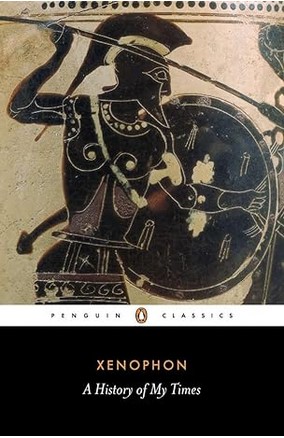
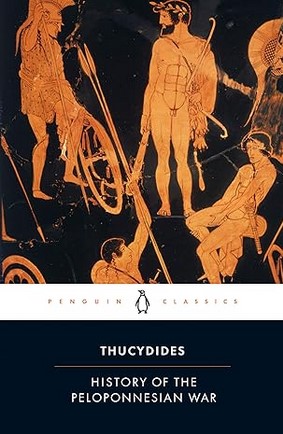
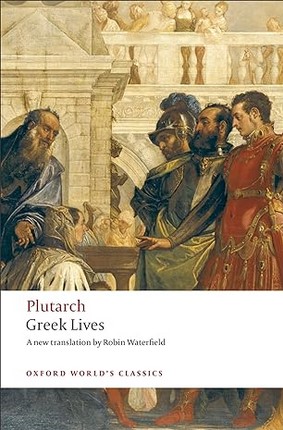

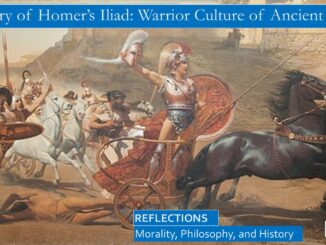
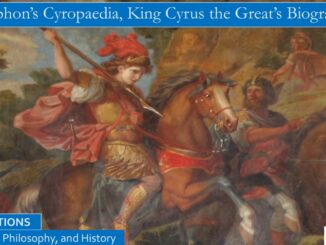

Be the first to comment